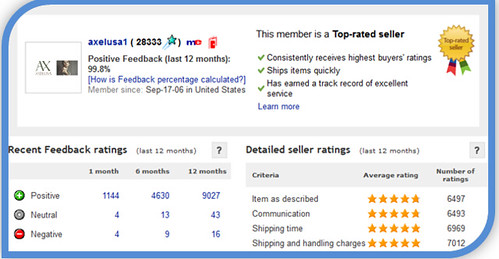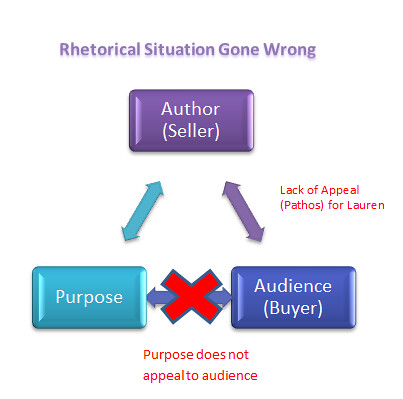Abstract
The amount of eBay users has almost tripled since the revamping of new technology designed to make e-commerce more convenient. Users of eBay tend to participate with the site to satisfy a desire of some sort. In order for this site to fulfill the users' desire, it incorporates a use of rhetoric. The most common form is the use of pathos. There is an over occurrence of the underlying emotional connection users and sellers have with eBay: trust, pride, and resentment. Online communities such as eBay.com use rhetoric to persuade users to buy and sell. Here will be an analysis of the rhetoric in this community by analyzing the author, purpose, genre,and even cultural context.
Rhetoric Writing on eBay
EBay.com has a purpose to create income from the wants and the needs of the audience. The audience has a purpose to fulfill their wants from this site and while doing so, emotions occur. I never knew that reading and writing played such a huge part of eBay.com. When analyzing the connection of reading and writing with the objective people have to purchase something they want, I discovered an emotional trend. The three emotions that are exhibited are trust, pride, and resentment. Often times, unintended emotions arise from the audience created by the writer. This surprise emotion is usually routed through the use of pathos. I often have experienced all of these emotions from eBay because I am a frequent shopper, but after analyzing my actions on why these emotions come about in this community it quickly linked back to the use of rhetoric.
Rhetorical Analysis-Trust
Lauran: How often do you use eBay and have you had great experiences with it?
Paris: I swear by eBay. I LOVE it. I have gotten lots of goodies from there. Anything I want and sometimes find things I do not even want but I just get because they are cheap. I have gotten satin sheets, polo hats, cell phone accessories, (very excited tone). The best experience I had was when I actually got to personally talk to the seller about this bundle of scarves I wanted. The descriptions were about every scarf and I was so confused. The seller actually let me call her and I was confident that I could buy them and get them in time. They arrived in like 2 weeks.
Lauran: Did you ever communicate with the seller again?
Paris: Yes, she bombarded me with emails asking for a review. She actually told me what to say and said I could just copy and paste it. I did. I imagine the reviews are important to her since she has so many, but I still only pay attention to stars though. I was really not pleased with her bombarding me.
Paris trust eBay because of her great experience with them. She speaks in an excited tone using emotional words such as "love, confident, and pleased". In terms of the rhetorical situation, the author or seller had the purpose to sell her products to a user. Paris first received the initial emotion of confused because the descriptions were all mixed up. Through the sellers use of pathos, she generated a result of trust from Paris. The author used pathos by appealing to Paris's needs of receiving the product on time. The author had incentive to fulfill the needs of Paris by recognizing her purpose of making a sale. This created the emotion of trust for Paris. This happens often on this genre of writing, an auction site. People are pleased with their sales and purchases which result in continuous use of this site just as Paris did. This helps to build the community, which strengthens the relationship between customers, as well as increases their use of the site.

Paris mentions that the seller bombarded her email asking her to write a review. The author actually told her exactly what to say. There were many repetitive comments for the users reviews and by the pressure she forced on Paris to write one it appeared important to her. The reviews seem to be the way the author creates their identity in this community. Paris mentions how she goes by the stars and the best seller sign. Creating identity in an auction community is important. Click here to read more on creating identity.
Rhetorical Analysis- Pride
The use of pathos on ebay can often create untended emotions by the different tropes and rhetoric tools used.
Wes illustrates the emotion of pride by using eBay because he received something that he really liked and was proud of. EBay tends to fulfill the wants of exclusiveness to buyers like Wes. Reading diiscritptions and viewing the photographs allows buyers to visually see what products they are buying. The descriptions go in depth of the picture which is where the initial “want” of the product is created. People tend to be proud of something they wanted and earned. I typed in “Snap back hat” into the search bar to experience what Wes experienced. The descriptions for this product was:
“Vintage GEORGIA TECH YELLOW JACKETS acc 1990 CHAMPIONS snapback HAT RARE!! You are looking at an ULTRA RARE snapback hat from 1990.
This is a GEORGIA TECH YELLOW JACKETS hat featuring "ACC CHAMPIONS 1990" on the front.
THIS IS THE SAME YEAR THEY WON THE NATIONAL CHAMPIONSHIP!!!
YOU WON'T FIND THIS HAT ANYWHERE ELSE!!!
Great condition!
Extremely EXTREMELY RARE! ”
This text really shows how rare this product is. The description is simple terminology and the language appeals to the audience that has a want for sport teams. It lets the buyer know the condition and describes the picture to the left. The words in this description are positive, over exaggerated, and appeasing to the buyer. These descriptions are created to sell the product, but also create an underlying emotion of pride for the buyers. An interesting twist to this situation is that the initial emotion Wes felt was excitement. With the over capitalization of words, 10 exclamation points, and the words used to make this product seem so rare all appealed to Wes' emotions. This strong use of pathos created excitement first, then a sense of pride after he received the exclusive hat.
Lauran: Have you ever you used eBay and what was your experience?
Wes: About a year ago I was looking for a snap back hat and I found one that I really loved. It was a Jazz snap back hat and I was very proud of it. I wore it for a long time until I sat on it. It was favorite accessory.
Lauran: You seem very excited. Can you tell me what made you feel that way?
Wes: It was just a quick easy buy and I really liked it. I ordered it and it came to me within a week. I was happy that I could get something that no one else had because this hat was not being sold in malls. It was old school.
Rhetorical Analysis of Resentment
Lauran: How often do you use eBay and have you had great experiences with it?
Lauren: I use eBay when I need something I usually cannot find in stores. I ordered some curling irons and the lady had me do an invoice so that she would do a two day shipping for me. I was going out of town to DC so I really needed that package so I could curl my hair the way I wanted. The package did not arrive and I was PISSED. I did receive the package eventually but I just do not trust her as a seller because she did not follow through after multiples e-mail
Lauran: Did you misinterpret her reviews or something? She seemed like she was not trustworthy and other buyers would know this.Lauren: That was my big issue. I spent time reading the reviews and they made her seem so GREAT! Obviously they were a lie. I will never go off reviews for eBay anymore. I wish I would have never bought them in the first place. It was just a hassle.

When the rhetorical situation is not flowing correctly, unintended emotional appeals can be generated. The author never intended for Lauren to walk away from her experience with resent. This emotion occurred because the author did not fully commit to pathos. The author appealed to Lauren's emotions initially to fulfill the purpose of getting a sale. After she received the sale, she never followed through meeting short of Lauren's expectations. The rhetorical situation seems to be driven solely by the author. Her purpose was without consideration of the needs and wants of Lauren. The audience, Lauren, was left out and resulted in a bad experience. The seller may not have been very concerned with Lauren's need of the product on time and this is where digital writing takes it course on the private versus public line. To read more about the realms of the public vs private issues in digital writing click here. Lauren made her request public by purchasing off the internet and even speaking to a complete stranger through email. Privately, Lauren had a trip to DC that created a deadline for this product. It was difficult to transfer the digital writing for of communication from public to private. This resulted in a late product and bad experience for Lauren. The lack of pathos used by the author , created resentment for the audience.
Conclusion
It is unusual to think of eBay.com as a culture of anything other than just auctioning products. Ebay.com being an auctioning site is just the genre. When using rhetoric, pathos is the best way to appeal to the people of this type of genre; an audience of buyers and writers who are auctioning products with a purpose to sell and buy at a decent price. When authors are true to their purpose and appealing to the buyers emotion, they tend to get the final result from their buyers that they wanted. If they tend to base their language torward a selfish purpose of only pleasing themselves, they audience will not persuade. The use of pathos in rhetoric creates the positive emotions by purposely appealing to the audience's emotions. By accidentally not appealing to the audience emotions, damage can be created where readers no longer can understand the writer or the purpose. Digital writing is a powerful way to reach a large number of readers and using pathos will definitely keep them interested.
EBay | Electronics, Cars, Clothing, Collectibles and More Online Shopping. Web. 08 Nov. 2011. <http://ebay.com>.
"Ebay." Personal interview. 30 Oct. 2011.
"An Ethnography of One Online Fan Community." Web.
McKennly, Wesley. "Ebay." Personal interview. 30 Oct. 2011.
Rogers Thomas, Paris. "Ebay." Interview. Print.





